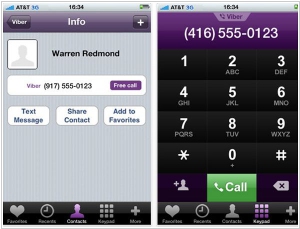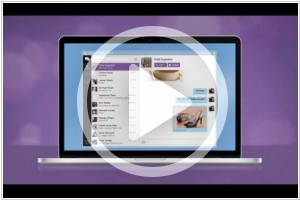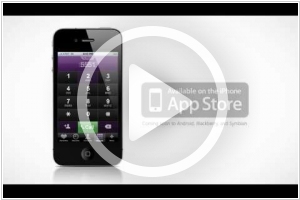Viber is #5 in Top 10 VoIP services
Viber is a mobile app that provides free international calls and text messages to other Viber users using 3G or Wi-Fi. Uses your existing contact list - check out which of your phone contacts and friends is already on Viber so that you can call and text them for free.
Positions in ratings
#5 in Top 10 VoIP services
#6 in Top 27 Business Messaging platforms
#8 in Top 14 Video Calling apps
Alternatives
The best alternatives to Viber are: WhatsApp, Telegram, Discord, Facebook Messenger, Signal, Skype, Line
Latest news about Viber
2022. Messaging app Viber launches Payments - a new digital wallet
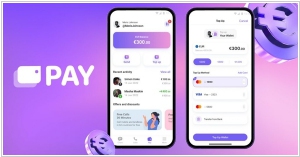
Viber, the messaging app owned by the Japanese e-commerce giant Rakuten, is introducing Payments on Viber, a new service that enables users to establish digital wallets linked to their Viber accounts. These Payments wallets can be connected to other bank accounts, as well as Visa and Mastercard, allowing users to make bill payments, purchase goods, and transfer money to other individuals. The initial launch of this service will focus on peer-to-peer transfers, which will be free of charge. However, there may be associated fees for services like payments to businesses. The service is initially rolling out in Germany and Greece, with plans to expand across Europe and eventually to Viber's broad global presence in 180 countries, spanning this year and the next.
2020. Viber launches group video calls for 20 users
Viber introduces its latest feature, the Group Video Calls, catering to the needs of large meetings and online classes. This new functionality allows for group video calls with a maximum of 20 participants and no time limit. Viber has already gained significant popularity with its Group Audio Calls, accommodating up to 20 individuals, and group chats, supporting up to 250 people. Given the current circumstances, Viber has expanded its capabilities by incorporating video communication. During Group Video Calls, the speaker is visible to all participants; however, users have the option to pin any video to their screen, whether it's their own or another participant's. Moreover, users can mute themselves or disable their video stream, as well as determine if other participants have activated the mute or video-off settings.
2017. Viber acquired shopping keyboard startup Chatter Commerce
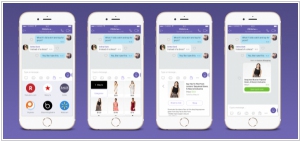
Earlier this year, messaging app Viber ventured into shopping services with its Instant Shopping feature, enabling users to search for items available for purchase directly within the app's interface. In a strategic move to compete with alternative platforms, Viber has recently acquired Chatter Commerce, the startup that played a significant role in developing this feature. This acquisition positions Viber to enhance its shopping capabilities. Speculations suggest that even Amazon is working on a consumer-centric messaging app. Additionally, Facebook has been expanding Messenger beyond basic chat, incorporating transactional features, bots, and other services. This highlights a notable trend among messaging apps, leveraging their existing user engagement to drive business growth through various avenues.
2017. Viber introduced secret chats with self-destructing messages
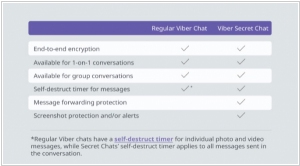
Viber has released an update for its iOS and Android versions, introducing the highly anticipated feature of "Secret Chats" to the service. Following in the footsteps of Snapchat, Facebook, Telegram, and other platforms, Viber now allows its users to set timers on their messages, resulting in self-destruction after a specified duration. Additionally, this new feature notifies the sender if the recipient takes a screenshot, a functionality initially popularized by Snapchat. Viber appears to be emphasizing its commitment to security by showcasing these features, setting itself apart from other messaging platforms. The introduction of end-to-end encryption and hidden chats last year further solidified Viber's dedication to privacy and security.
2017. Viber adds e-commerce feature
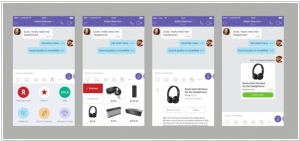
Messaging app Viber, owned by e-commerce company Rakuten, aims to capitalize on e-commerce while avoiding intrusive advertising. Viber plans to introduce a new feature where users can explore items for sale related to their current chat by tapping on a small shopping bag icon at the bottom of the screen and conducting a search. The initial launch of this feature will take place in the U.S. on March 6, with plans to expand to other markets later. Users will not be able to make purchases directly within Viber; instead, they will be redirected to the relevant page in the respective brand's app via a deeplink.
2016. Viber launched Public Accounts for businesses
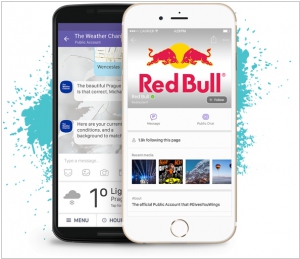
Messaging app Viber is introducing Public Accounts for businesses and brands seeking to engage with Viber users for marketing purposes, customer service, or a combination of both, without the requirement of adding the account as a contact first. Users can now simply subscribe to these accounts. Additionally, by the end of November, Viber's API will be seamlessly integrated with approximately 10 to 15 popular CRM packages, enabling businesses to manage their Viber messages alongside their other social media, email, and messaging interactions. With the introduction of Public Accounts, Viber joins the ranks of other consumer-focused messaging apps such as WeChat, Line, and Facebook Messenger, all of which offer similar features.
2016. Viber adds end-to-end encryption and hidden chats
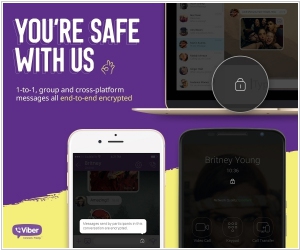
Following in the footsteps of WhatsApp, Viber, another popular messaging app, has introduced end-to-end encryption for all messages and calls on its platform, including group chats (supporting up to 200 people). Additionally, Viber now offers a feature to 'hide' chats on your account, complementing its existing expanded deleting function. These new privacy features are available across Android, iOS, PCs, and Mac desktops, and can be activated by updating to the latest app version (6.0) and reauthenticating the app via QR Code. Viber's encryption provides different levels of security, visually represented by a color-coded lock displayed on the right side of the screen.
2014. Viber adds public chats
Messaging app Viber is set to unveil a new social feature called Public Chats, which allows users to leverage its direct messaging and voice services for broadcasting to a wider audience. With Public Chats, users will have access to live conversation streams from celebrities and other interesting individuals, providing followers with the opportunity to observe the discussions without necessarily participating in them. Users will only be able to engage in Public Chats if the corresponding account is in their contacts. Currently, there is no universal option for enabling public streams, but those who believe their chats are Public Chat-worthy can contact publicchats@viber.com.
2014. Japanese internet giant acquires Viber
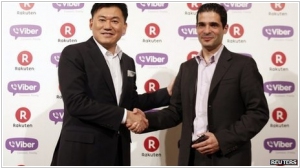
The Japanese company Rakuten has made a significant acquisition, securing Viber, which is currently considered one of Skype's main competitors, for a whopping $900 million. This development brings to mind the recent acquisition of fring by the American company Genband, which resulted in fring being transformed into a white-label communication platform tailored for telecom providers. However, there is no need to worry about Viber in this case. Rakuten does not intend to shut it down or reshape it according to its own business model. Instead, they plan to invest money into Viber with the hopes of competing against Skype and eventually recouping their investments, possibly through the sale of ViberOut voice call minutes. Rakuten is known for its diverse business ventures, including investments in internet startups. For instance, they own the ebook platform Kobo, have a stake in Pinterest, Play.com, and other online projects. For those unfamiliar, Viber is a cross-platform instant messenger renowned for its support of free voice and video calls. Currently, the service boasts around 300 million users.
2013. Viber now can call landline and mobile phones
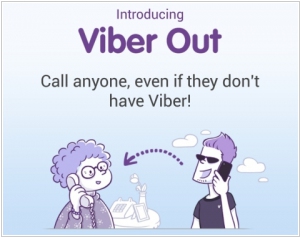
Despite Microsoft's hands-off approach to Skype, the majority of people continue to rely on it. However, even the slightest misstep from Microsoft could pave the way for alternative services vying to replace Skype as the de facto standard for internet communications. Leading the pack is Viber. This service has gained significant popularity, boasting over 200 million users, thanks to its mobile-first strategy and simple authorization via mobile numbers. Currently, Viber and Skype offer virtually identical features. Recently, Viber addressed one of its remaining gaps by introducing the ability to make calls to landline and mobile phones at affordable rates, which are slightly lower than Skype's. For instance, calls to Indian landlines cost 2.5 cents (4.5 cents to mobile phones), calls to Mexico cost 2.3 cents (9.9 cents to mobile phones), calls to all China numbers cost 2.3 cents, and calls to the U.K. cost 1.9 cents (5.9 cents to mobile phones). This new feature is available on Android, iPhone, and Viber desktop (PC and Mac) platforms.
2013. Viber launched desktop version
While Skype was slow to make its move onto mobile platforms, mobile video chat service Viber managed to capture widespread popularity. With a user base of 200 million, it appears to be at the forefront of services aiming to replace Skype as the go-to independent communication app. Just yesterday, Viber released desktop versions for both PC and Mac. However, to utilize these desktop versions, it is still necessary to first install the mobile app since Viber accounts are linked to phone numbers. Notably, the most intriguing feature of Viber's desktop version is its seamless transition between desktop and smartphone without interrupting ongoing calls. Furthermore, all messages and contacts are automatically synchronized between the mobile and desktop versions, and incoming calls are directed exclusively to the device (computer) currently in use.
2011. Viber takes on Skype with free HD VoIP calls
When VoIP-telephony lived mostly on desktops, it is difficult to imagine that someone could become a serious competitor for Skype. Even Google failed to solve this task. But now when the VoIP market is rapidly expanding to mobile devices, Skype can't feel so confident any more. Unlike the world of computers (where it was possible to develop single Windows-client), the world of mobile platforms is much more complicated. First, there are many of them, and second - it needs to develop the other VoIP technology. Therefore, the old rivals and even new startups are trying to take on Skype in the mobile VoIP sphere. Viber - is one of the newcomers. This service launched at the end of last year and has already attracted several millions of users. So by means of what Viber is going to beat Skype? ***

